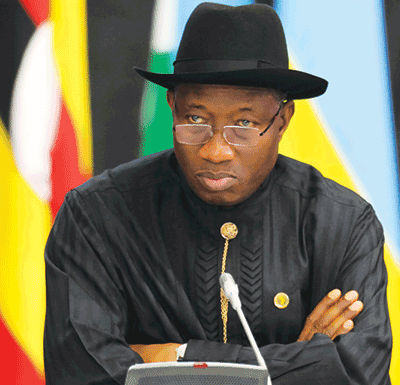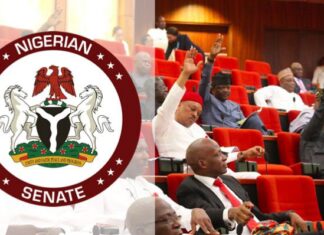Activists examine Nigeria’s democratic experience and conclude that it is still an extension of military rule, writes Reporter, MARY OGEDENGBE…
On September 15, the United Nations (UN) celebrated the International Democracy Day. Its aim as always was to promote and uphold the principles of democracy. Nigeria, being a member of the UN, took part in observing the day whose theme was ‘Engaging young people on democracy’.

But how has the country’s democracy fared in the last 15 years since the last military ruler handed power to President Olusegun Obasanjo on May 29, 1999?
On this score, civil society groups say politicians have failed to grow Nigeria’s democracy.
Public affairs analyst and deputy chairman, Joint Action Front (JAF), Achike Chude, said democracy is worth celebrating in any country because it symbolises everything good about a government and it means the people are active participants. However, it is his belief that the mentality of democracy in Nigeria is unfitting, as there is an increase in culture of impunity, poor governance and lack of transparency and accountability.
National Coordinator, Network on Police Reform in Nigeria (NOPRIN), Okechukwu Nwanguma, said the reign of impunity and arbitrariness has marred Nigeria’s democracy.
“The performance of law-enforcement organs, political partisanship and corruption impede reform efforts, and a culture of violence and intimidation stands in the way of citizens’ access to peace, security and justice. The state has failed to fulfil its human rights obligations under domestic and international law,” he said.
Nigeria’s democratic experiment
At the recent Democracy Day in Nigeria, President Goodluck Jonathan stated that remarkable progress had been made since the first Democracy Day on May 29, 1999 which he said was palpable, citing improved power and water supply, education and housing as democratic gains.
But the president was quickly reminded that many communities like the Ipoyewa in Ikorodu have not had power supply since 2011.
In the area of housing, he was also told that communities like the Makoko area of Lagos literally live on water in makeshift houses.
On education, the rate of secondary school attendance is 32 per cent for the males and 27 per cent for the females.
Security has reached an all-time low, as Northerners today live every day as if it is their last due to the fear of being abducted or blown apart by bombs from the dreaded Islamic fundamentalist sect, Boko Haram.
Since April this year, about 250 secondary school girls were abducted from Chibok, Borno State. And few days ago, another 50 young women were kidnapped in the same state.
The international community is, however, stunned at how a putative democratic state like Nigeria will allow the abduction of young girls.
The government is yet to come up with a plausible and permanent solution for insurgency. In the words of Hilary Clinton, “the government of Nigeria has been, in my view, somewhat derelict in its responsibility towards protecting boys and girls, men and women in Northern Nigeria over the last years… They have squandered their oil wealth, they have allowed corruption to fester and now they are losing control of parts of their territory because they wouldn’t make hard choices.”
And despite these apparent failings, President Jonathan has been offered the Peoples Democratic Party (PDP)’s presidential ticket by the party’s governors, lawmakers and leadership for next year’s general election.
Abuse of executive power
First female President of the Republic of Kosovo, Atifete Jahjaga, said “Democracy must be built through open societies that share information. When there is information, there is enlightenment. When there is debate, there are solutions. When there is no sharing of power, no rule of law, no accountability, there is abuse, corruption, subjugation and indignation.”
The ushering in of democracy in Nigeria brought with it outright disregard for the rule of law by those who are in the position to uphold it. For instance, the administration of Olusegun Obasanjo between 1999 and 2007 showed a consistent proclivity for flouting court orders and judgments.
Pan the crane to the Jonathan administration. In terms of press freedom in Nigeria, the Freedom House has rated it as ‘partly free’. Last year, editors of a notable newspaper were arrested ‘by proxy’ for charges of forgery. About 10 newspapers this year were harassed and their materials impounded. These all are characteristics of a military regime, but are reported to have happened in a democratic state.
On the area of corruption, the administration of President Jonathan has consistently been scored low. On September 5, $9.3 million was seized from a private jet by the South African Immigration.
The South African authorities believed that the jet, belonging to the founder and Senior Pastor of Word of Life Bible Church in Warri, Ayo Oritsejafor, was involved in a classic case of money laundering. But it took the Nigerian government 11 days to respond to the highly embarrassing situation.
Nigeria issued an unsigned statement saying: “The federal government has submitted relevant data and documents on the transaction to South Africa and insisted that the transaction was legitimate. It also clarified that the funds were not laundered or smuggled for any covert manoeuvres. No launderer will be audacious to fly into a country in a chartered jet with such huge cash.”
Police still a friend?
The Nigerian Police Force (NPF) was instituted to be the principal law enforcement agency in the country. Record has it that the NPF is the ninth largest in the world and the largest in Africa with a ratio of 205 officers per 100,000 citizens.
However, the catch phrase, ‘police is your friend’ negates the current situation of what the average Nigerian citizen faces in the hands of police officers. They swore to protect the defenceless, but have become the worst nightmare for so many.
In April 2014, a video went viral of a certain police officer, Tafa Mohammed, using his rifle to brutalise two women around the Obalende area of Lagos Island because one of them refused to give him a piece of fish in her restaurant. Also, in Enugu State last year, a man was unlawfully detained, harassed, intimidated and tortured by police officers. The case was taken to court and the Nigerian police was made to pay a sum of N3 million for the injustice done to him.
The list is endless, from violation of rights, unauthorised detention, rape of suspects, bribery and corruption to unlawful killing, the Nigerian police do it all. And they do it in a democratic state.
Chude believes that one of the factors of a democracy is the ability of a government to guarantee the safety of the people; but since this is lacking in Nigeria, it means democracy is non-existent.
A judiciary to question
The judiciary of any democracy practising country is independent from every other arm of government and should be able to make independent decisions regardless of anything. But the true situation of the Nigerian judicial system is one where it is believed that the presidency has overwhelming control over it. One example that comes to mind is the Ayo Salami saga.
Salami was removed from office as the President of the Court of Appeal (PCA) by the National Judicial Commission (NJC). The President eventually ignored the recommendation of the same NJC for his reinstatement.
Nigeria’s judiciary is also accused of collecting gratification to deliver rulings in favour of politicians. For instance, in 2007, a governor of a South South state secured a permanent injunction from the Federal High Court preventing the Economic and Financial Crimes Commission (EFCC) from prosecuting or investigating the charges levelled against him.
For Chude, “the judicial system is not working because people with money can buy justice, and institutions of the government are set up to serve the rich.”
According to Nwagwuma, a recent report released by Amnesty International (AI) provides cases of torture and abuse by police officers which the Nigeria Police Force has denied. He cited the example of one Chinagorom Ihejiagwa, who has been in detention at SARS Awkuzu since May 29, 2014. A High Court in Anambra had made an order in June on the Commissioner of Police (CP) and in particular, James Nwafor, the O/C SARS Awkuzu, to grant him bail or produce him in Court. The O/C SARS not only dismissed the order but has continued to contemptuously disregard it.
The way forward
Nwanguma contends that “civil society organisations must lead the charge in pushing Nigerian leaders to commit to genuine police reform. Such reform can only occur in the context of mutual understanding, trust and cooperation between local communities and the police, with both sides working together to identify and implement concrete reforms, including the decentralisation of the police force, the separation of the executive branch from the criminal justice system, and the rehabilitation of community-police relations.
“Unless these reforms are enacted, the Nigerian people’s aspiration for an effective, democratic, and humane police force will remain an elusive dream.”
Other stakeholders insist that credible people must be elected to public offices, if our democracy must grow.
But there is no how the credible will be elected if the politics of stomach infrastructure is not done away with.











